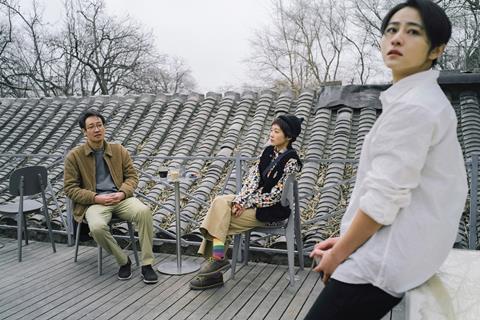A divorced man strikes up a relationship with a younger woman in Zhang Lu’s Berlin Competition title

Dir/scr: Zhang Lu. China. 2023. 144mins
Chinese filmmaker Zhang Lu chips away at his favourite theme of emotional and geographical displacement in a film that marks a mature new chapter for a director whose output since Grain In Ear – the 2005 title that first brought him to international attention – has been variable, to say the least. Though it has its slow moments, Lu’s first Berlinale Competition entry since Desert Dream in 2007 builds to become a poignant drama of people seeking a connection in contemporary Beijing, one that smuggles in a mosaic of reflections about life in the People’s Republic of China in a narrative centred on a divorced food critic with father issues who connects with a much younger female colleague.
The film is deeply rooted in the paradox that is contemporary Beijing
Shadowless Tower is a film that can be read on several levels, and could reach patient festival audiences even though they may not pick up on the raft of local cultural and literary references deployed here by the writer-director, who has Korean heritage and has worked between China and Korea. Indeed, in some ways this could be a European arthouse feature in its exploration of middle-class characters with middle-class issues – and it’s perhaps no accident that there are several nods at French culture. But the film is also deeply rooted in the paradox that is contemporary Beijing, painted here as a city of exile; a metropolis torn between tradition and modernity.
When restaurant reviewer Gu Wentong (Xin Baiqing) begins to talk about the edifice that gives the film its title, the White Stupa Temple (or Miaoying Temple) in the sprawling city’s Xicheng district, he tells his young photographer Ouyang Wenhui (Huang Yao) that its shadow can’t be seen because it falls far away, on the Tibetan plateau. There’s a lot of history to unpack in that comment. There’s also plenty to unpack – an intriguing mix of nostalgia and irony, to start with – in a scene where a group of middle-aged schoolfriends gett drunk and emotional during their annual reunion and start singing a song called ‘Beijing Welcomes You’, composed for the 2008 Summer Olympics.
Yet Lu’s latest is also about a universal personal history, the things we forget to keep track of because, like Wentong, we’ve got too much else going on. Although this is a very different film, its slow-burn delve into past trauma and central relationship between an older writer and a younger woman from a difficult background will remind many of Drive My Car. Here, though, the tone is more wistfully romantic – even playful at times.
Forty-something Wentong lives alone in the cramped apartment he inherited from his deceased mother, in the non-shadow of the White Stupa Temple. Divorced, he has a sweet and smart young daughter, who lives with his sharp-tongued sister and her easy-going husband. It’s the latter who reveals that for years he has been in secret contact with Wentong’s father Gu Yunlai (the director Tian Zhuangzhuang), who was thrown out of the house by Wentong’s mother following a disgrace that landed him in prison. Beidahe, the Hebei province beachside town where his lonely kite-flying dad ended up, also happens to be the hometown of perky photographer Wenhui, a modern girl with something of a Jean-Seberg-in-Breathless vibe.
Though the burgeoning relationship between Wentong and Wenhui rings warning bells at first – another middle-aged male director pairing a middle-aged man with a pretty young woman – it does not go the way one might expect. The film’s delicacy of touch comes through not only in the bittersweet love story at its centre, but in a wealth of seemingly marginal details.
In a film that makes frequent reference to levels of formality (Wentong tells Wenhui that his marriage failed because both he and his ex-wife were “just too polite”), the camera keeps a respectful distance, favouring long or medium shots over close-ups and conveying the refractory nature of its characters emotions by framing through doors, windows, down corridors, in mirrors and even with a pan from its tentative couple’s arrival at a love hotel in the receptionist’s CCTV camera to their flesh and blood entry. And just in case we needed prompting that this tender film is also a profound meditation on what unites and divides people, it’s then revealed that this same receptionist is reading French structuralist Roland Barthes’ celebrated deconstruction of love – Fragments Of An Amorous Discourse.
Production company: Shanghai Lu Films
International sales: Films Boutique contact@filmsboutique.com
Producers: Zhang Jian, Han Mei, Xu Jiahan, Peng Jin
Production design: Zheng Yican
Editing: Liu Xinzhu
Cinematography: Piao Songri
Music: Xiao He
Main cast: Xin Baiqing, Huang Yao, Tian Zhuangzhuang, Nan Ji, Wang Hongwei















![[L-R]: Amanda Villavieja, Laia Casanovas, Yasmina Praderas](https://d1nslcd7m2225b.cloudfront.net/Pictures/274x183/6/4/1/1471641_pxl_20251224_103354743_618426_crop.jpg)








